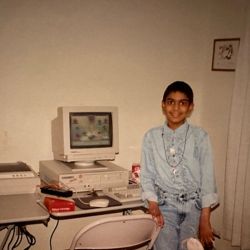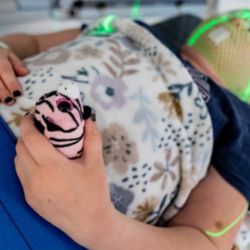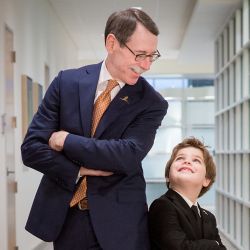Cancer Survivor Story: Paris Prinsen
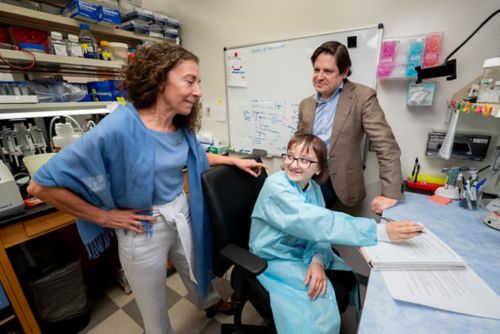
Paris Prinsen (center) talks with colleagues during her summer student trainee job in a research lab at St. Jude Children’s Research Hospital.
There’s a common saying: “When life hands you lemons, make lemonade.”
When life handed Paris Prinsen a stage 4 neuroblastoma diagnosis as a baby, doctors gave her a chance at life with chemotherapy, surgery, radiation, and immunotherapy treatments.
When life handed her an osteosarcoma diagnosis in 2016, physical therapists provided the equipment and support she needed to walk again.
When she did not have the 2 years of college required to work in a hospital lab as a Pediatric Oncology Education student, Prinsen got the position, thanks to a student trainee award from Alex’s Lemonade Stand Foundation for Childhood Cancer.
All the lemony moments in Prinsen’s journey could have left her feeling sour. Instead, she refuses to let cancer define her present or future. Once a patient at Dana-Farber Cancer Institute and Boston Children’s Hospital, she now thrives as a student at the Massachusetts College of Pharmacy and Health Sciences.
“Boston is where I was treated, and now I’m there for something entirely different,” she says. “I’m independent. I can do whatever I want. I can build more positive memories instead of traumatizing ones.”
Treatment challenges
Prinsen considers the long-term and late effects of treatment—such as constant fatigue and migraines—to be less troublesome than those she experienced during cancer therapy.
The chemotherapy caused mouth sores that persisted until her immune system recovered. She was given “magic mouthwash” to help with the skin deterioration on her tongue. “It was like swishing yogurt,” she recalls. “The pain was like having strep throat on your tongue.”
During that time, Prinsen was unable to eat certain foods. For instance, the smell of chicken made her nauseated. “It didn’t help being a picky eater, either,” she says.
Prinsen had surgery the week of her birthday and wanted to get home to be with her friends. That determination paid off as she was able to get home for her birthday. “My bedroom was upstairs, so for 3 months, I slept on the couch in the living room. It was my territory,” she says with a laugh.
Overcoming isolation
Prinsen felt isolated in middle school after her diagnosis and treatment. She could talk with her care providers but lacked peer support.
“I didn’t have any friends who understood how I felt,” she says. “I was paralyzed from the waist down on the left side of my body, had foot drop, and wore a leg brace for ankle support. I went to middle school with a walker. It was nice to have it for comfort in case I fell, but it was also big and embarrassing. I remember someone thought I played soccer because of my leg brace. I didn’t, but I just went along with it,” she says with a smile.
Foot drop is the inability to lift the foot due to muscle weakness or paralysis. Prinsen used a wheelchair for a brief time, and her care team encouraged her to use a walker to help with stability. Today, she can walk short distances. “I’m glad physical therapy exists,” she says. “I did that to get feeling back in my leg, and it helped with the foot drop.”
Prinsen’s treatment ended the week before 7th grade. The most challenging part of her transition back to school was navigating emotions.
“Middle school was tough. I was the ‘cancer kid’ when I got back to school. My 5th and 6th grade friends got to hang out and connect while I was in the hospital. I was fine with talking about cancer, but no one wanted to talk with me. It felt so isolating. Part of me wanted someone to pick on me just so they would talk to me.”
Creativity and coping
Prinsen felt isolated during her high school years as well, struggling with suicidal thoughts. Learning to express her feelings in creative ways helped alleviate those symptoms.
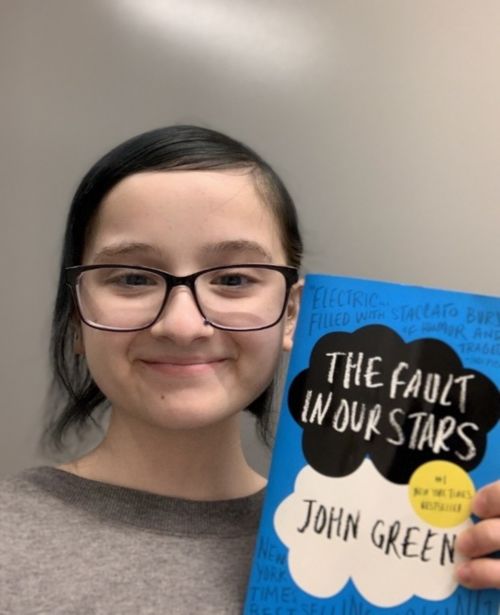
“If you’re struggling with understanding your or someone else’s cancer diagnosis, I recommend the book The Fault in Our Stars," Prinsen says. “I read it a year after treatment, and it helped me cope a lot with feelings. I also refer friends to it.”
“I’m happy my high school had good science programs and teachers. I also had a great teacher for advanced-placement art during my senior year, and I created confrontational art based on my experience with cancer,” she says. “Having a fresh start in college has shown me that I’m more than what I went through.”
Prinsen still feels susceptible to flashbacks and memories—some days more than others. Coughing is a big trigger for anxiety because it reminds her of the 3 weeks she spent in the ICU with no immune system while simultaneously dealing with pneumonia.
A fresh start
Talking with a therapist and taking medicine for depression have helped Prinsen adjust to life after cancer treatment. She also has found power and peace through perspective—both as a cancer survivor and student researcher. Sharing her story is one way she can provide hope for patients and families when they need it most.
“Seeing things from different perspectives is important, especially in research,” says Prinsen, who spent the summer of 2023 working in a lab at St. Jude Children’s Research Hospital. “Being compassionate helps me face a problem more effectively in the lab and my day-to-day life. I may not have had the same exact cancers, but I understand the challenges and feelings that other patients feel.”
“Vulnerability was especially hard during treatment,” Prinsen recalls. “I was trying to be strong for my family while needing to lean on someone too. I never wanted to see my mom cry, and it’s still hard for me to cry.”
“The minute things everyone goes through but thinks no one else feels that way? Those feelings aren’t weird. If I can help someone and make sure they know they’re not alone, I want to do that,” Prinsen says.


